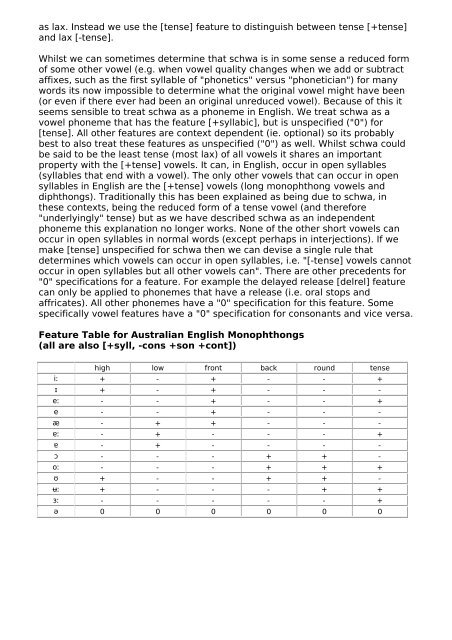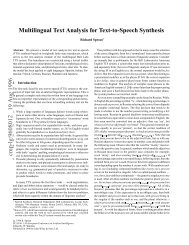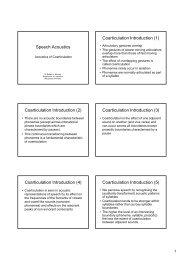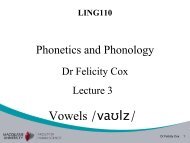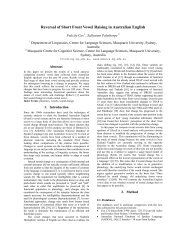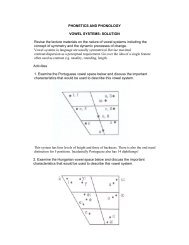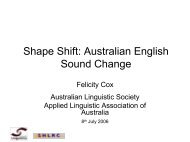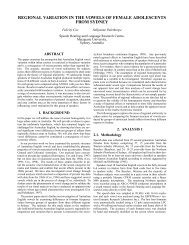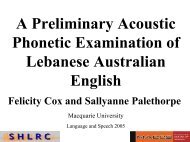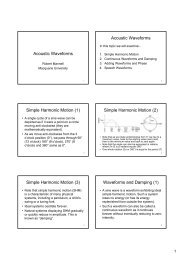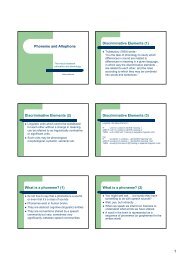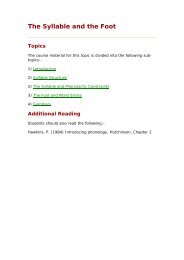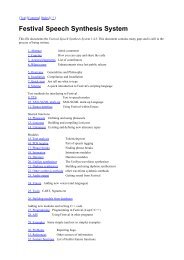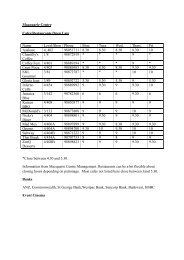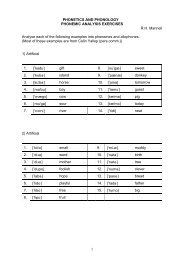Distinctive Features - Speech Resource Pages - Macquarie University
Distinctive Features - Speech Resource Pages - Macquarie University
Distinctive Features - Speech Resource Pages - Macquarie University
You also want an ePaper? Increase the reach of your titles
YUMPU automatically turns print PDFs into web optimized ePapers that Google loves.
as lax. Instead we use the [tense] feature to distinguish between tense [+tense]<br />
and lax [-tense].<br />
Whilst we can sometimes determine that schwa is in some sense a reduced form<br />
of some other vowel (e.g. when vowel quality changes when we add or subtract<br />
affixes, such as the first syllable of "phonetics" versus "phonetician") for many<br />
words its now impossible to determine what the original vowel might have been<br />
(or even if there ever had been an original unreduced vowel). Because of this it<br />
seems sensible to treat schwa as a phoneme in English. We treat schwa as a<br />
vowel phoneme that has the feature [+syllabic], but is unspecified ("0") for<br />
[tense]. All other features are context dependent (ie. optional) so its probably<br />
best to also treat these features as unspecified ("0") as well. Whilst schwa could<br />
be said to be the least tense (most lax) of all vowels it shares an important<br />
property with the [+tense] vowels. It can, in English, occur in open syllables<br />
(syllables that end with a vowel). The only other vowels that can occur in open<br />
syllables in English are the [+tense] vowels (long monophthong vowels and<br />
diphthongs). Traditionally this has been explained as being due to schwa, in<br />
these contexts, being the reduced form of a tense vowel (and therefore<br />
"underlyingly" tense) but as we have described schwa as an independent<br />
phoneme this explanation no longer works. None of the other short vowels can<br />
occur in open syllables in normal words (except perhaps in interjections). If we<br />
make [tense] unspecified for schwa then we can devise a single rule that<br />
determines which vowels can occur in open syllables, i.e. "[-tense] vowels cannot<br />
occur in open syllables but all other vowels can". There are other precedents for<br />
"0" specifications for a feature. For example the delayed release [delrel] feature<br />
can only be applied to phonemes that have a release (i.e. oral stops and<br />
affricates). All other phonemes have a "0" specification for this feature. Some<br />
specifically vowel features have a "0" specification for consonants and vice versa.<br />
Feature Table for Australian English Monophthongs<br />
(all are also [+syll, -cons +son +cont])<br />
high low front back round tense<br />
iː + - + - - +<br />
ɪ + - + - - -<br />
eː - - + - - +<br />
e - - + - - -<br />
æ - + + - - -<br />
ɐː - + - - - +<br />
ɐ - + - - - -<br />
ɔ - - - + + -<br />
oː - - - + + +<br />
ʊ + - - + + -<br />
ʉː + - - - + +<br />
ɜː - - - - - +<br />
ə 0 0 0 0 0 0


